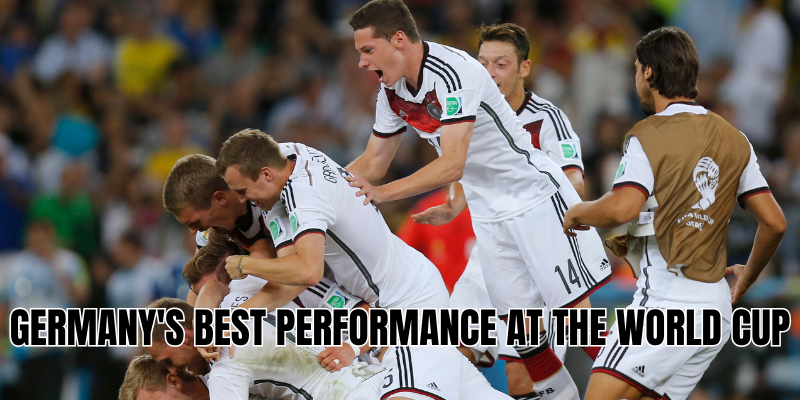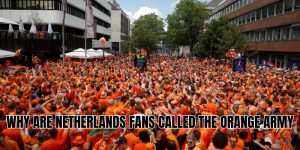From the first whistle in 1934 to the high-stakes theatrics of 2014, Germany’s journey in the FIFA World Cup is one of resilience, brilliance, and unforgettable moments. But when fans ask about Germany’s best performance at the World Cup, what truly defines “best”? The trophies, the dominance, the historical weight, the records smashed — all matter. In this article, QuraGoal will accompany you to explore Germany’s most outstanding peaks on football’s biggest stage, comparing triumphs, tactics, stars, and moments of glory.
Germany’s World Cup Legacy: Titles, Consistency, and Records
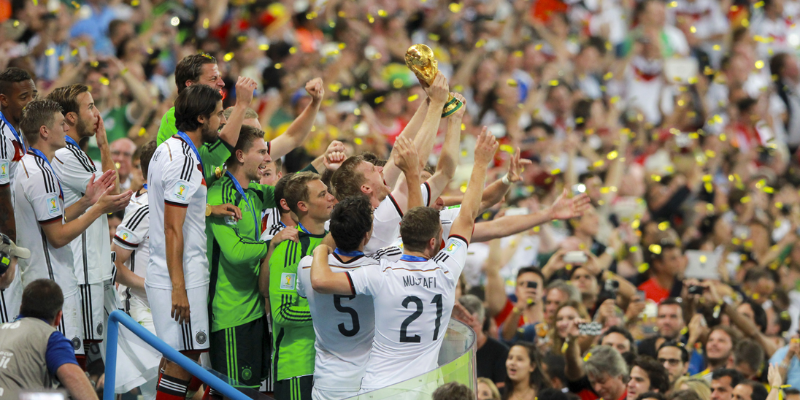
Germany (including West Germany) is among the pantheon of football powers at the World Cup. Over the decades:
- They have won four World Cup titles (1954, 1974, 1990, 2014).
- They have reached the podium (top 3) 12 times across about 20 tournaments.
- They have advanced to at least the quarter-finals in 17 out of 20 participations, a mark surpassed only by Brazil.
- Their ability to combine deep runs with consistency makes them one of the most dependable teams in tournament history.
These achievements alone set the scene: Germany doesn’t just win — they rarely disappear early. Their worst finishes (group stage exits in 1938, 2018, 2022) stand out as surprising anomalies in a record book otherwise filled with deep performances.
Yet, when fans debate Germany’s best performance at the World Cup, many point to one in particular — the 2014 triumph in Brazil.
Why 2014 Stands Out: Dominance in Brazil
A Trophy in South America, Dramatically Won
While each German title has merit, the 2014 victory carries special weight:
- It was the first time a European nation won a World Cup in South America.
- It marked the first German title after reunification, proving the strength of the unified national project.
- Germany defeated Argentina 1–0 in extra time in the final, through a Mario Götze goal — a moment that has etched itself into football folklore.
The path to that title was ruthless. Germany dismantled Brazil 7–1 in the semi-final, delivered clinical knockout performances, and played with a confidence and fluidity rarely seen on the world stage.
Statistical and Tactical Mastery
- Over the tournament, Germany combined a high-scoring offense with granite defense.
- They showed versatility: pressing, possession, quick transitions, aerial power — all in one tournament.
- In the final, Argentina failed to record a shot on goal. That defensive dominance under pressure is rare in finals.
In sum, while other German wins had historical context (hosting, political backdrop, revenge, etc.), 2014 stands as footballing perfection across many dimensions. Many analysts and fans agree: Germany’s best performance at the World Cup is that finely tuned, balanced, ruthless campaign in Brazil.
Other German High Points — Comparing Greatness
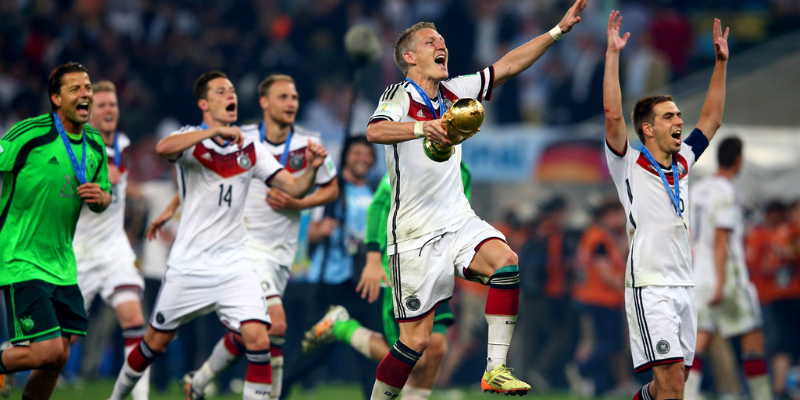
To fully understand how 2014 ranks, it helps to revisit the other German titles and their unique stories.
1954 “Miracle of Bern” — against all odds
As West Germany, the team was huge underdog against the legendary Hungary “Golden Team.” Hungary had thrashed them 8–3 earlier in the tournament. But in the final, Germany turned a 0–2 deficit into a 3–2 win. It became known as the “Miracle of Bern.”
That victory had extraordinary symbolic power — post-war Germany rising again — and is often cited as their most emotional World Cup achievement.
1974 — Champions on home soil
Hosting the tournament, West Germany felt pressure. After losing to East Germany in the first round, they rebounded to win the final 2–1 against the Netherlands. Gerd Müller’s goal sealed it. In that tournament, they had to overcome the Dutch “Total Football” revolution. Victory with famine of style and pressure — that’s a testament to heart and structure.
1990 — Legacy, revenge, and grit
West Germany entered 1990 with the shadow of 1986 and 1982 finals losses. Reaching a third successive final, they beat Argentina 1–0. It was a tactical, bitter battle — European precision over South American flair. Closing down Maradona’s Argentina in a final, under pressure, signaled a hallmark of German steel.
How to Judge “Best”? Metrics and Criteria
When debating Germany’s best performance at the World Cup, fans and analysts often weigh:
- Quality of opposition and margin — beating elite teams convincingly (e.g. 7–1 over Brazil in 2014).
- Dominance from group stage to final — minimal slip-ups along the way.
- Historical significance — first European win in South America, reunification era, home soil advantage, etc.
- Narrative arc and drama — redemption, surprises, iconic moments.
- Statistical benchmarks — goals scored, goals conceded, shot dominance, defensive solidity.
By these metrics:
- 2014 excels in dominance, consistency, and statistical performance.
- 1954 trumps in drama, underdog status, and emotional symbolism.
- 1974 shines in performing under home expectations and stylistic rivalry.
- 1990 stands for tactical resilience and final-level nerve.
Each has a claim. If forced, though, 2014 emerges as the “most complete” performance: stylistically, tactically, statistically, and with narrative weight.
Top Moments From Each Title Run
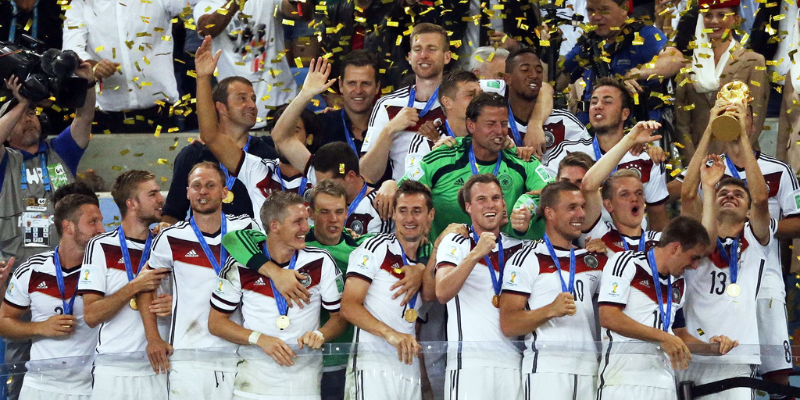
Here are unforgettable highlights that define Germany’s golden campaigns:
| Year | Key Moment | Why It Matters |
| 1954 | Winning goal by Helmut Rahn in 84th minute | “Miracle of Bern” is etched as greatest German upset |
| 1974 | Gerd Müller winning goal vs Netherlands | Turning point in face of Dutch brilliance |
| 1990 | Brehme penalty in final | Winning under pressure, against Maradona’s Argentina |
| 2014 | Götze extra-time volley in final | Embodies decisive, clutch brilliance; crowning moment |
These moments aren’t mere facts — they live in fans’ hearts. They shape how generations remember “Germany’s best performance at the World Cup.”
Legacy, Records & Influence
Beyond the four championships, Germany’s World Cup story is rich with records:
- Their quarter-final consistency (17 of 20 times) shows depth of culture and preparation.
- Miroslav Klose became the all-time top scorer in World Cup history.
- Lothar Matthäus holds the record for most matches played in World Cups.
- Germany has more third-place finishes than any other nation.
- Their ability to reinvent across eras — from searing 1950s squads to the modern pressing machine — speaks to institutional strength.
As fans look back, Germany’s best performance at the world cup isn’t just one tournament — it’s a continuum. But 2014 is where ambition, talent, preparation, and execution coalesce.
Final Thoughts
Germany’s best performance at the World Cup is a question that invites passion, memories, and lively debate. The 2014 triumph in Brazil often claims top spot — the sheer dominance, balanced style, statistical supremacy, and symbolic weight make it hard to beat. Yet 1954’s miraculous underdog story, 1974’s home-soil redemption, and 1990’s tactical fight all hold rightful claims.
Whether you lean toward 2014 or revere the drama of 1954, the fact remains: Germany has built a legacy that few nations can match. It’s a legacy of consistency, excellence, reinvention, and moments that echo through football history.
In this article, QuraGoal shared with you a deep dive into the peaks of German World Cup glory. If you’ve got a favorite German campaign or want to compare with other national teams’ bests, drop your thoughts below or explore more with QuraGoal on our review of World Cup legends and top performance debates.

